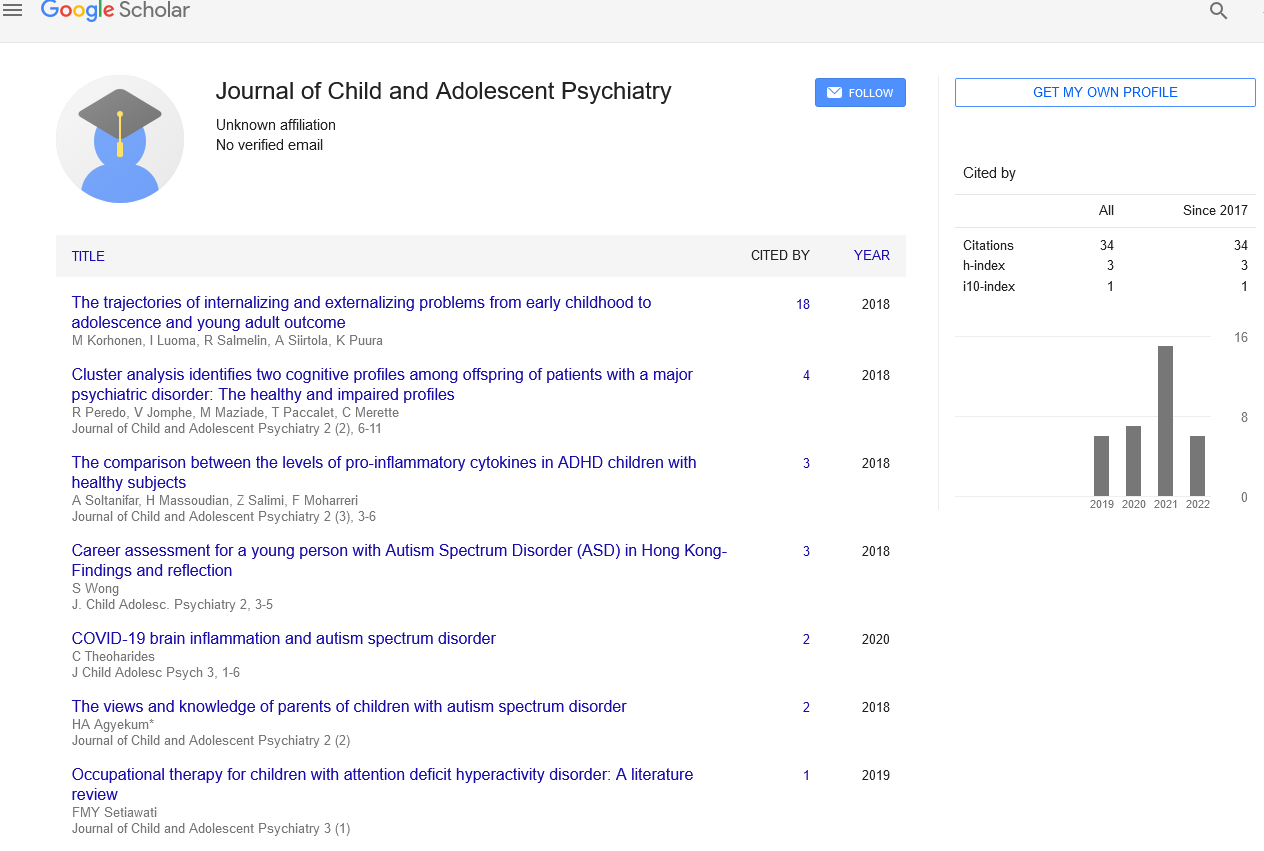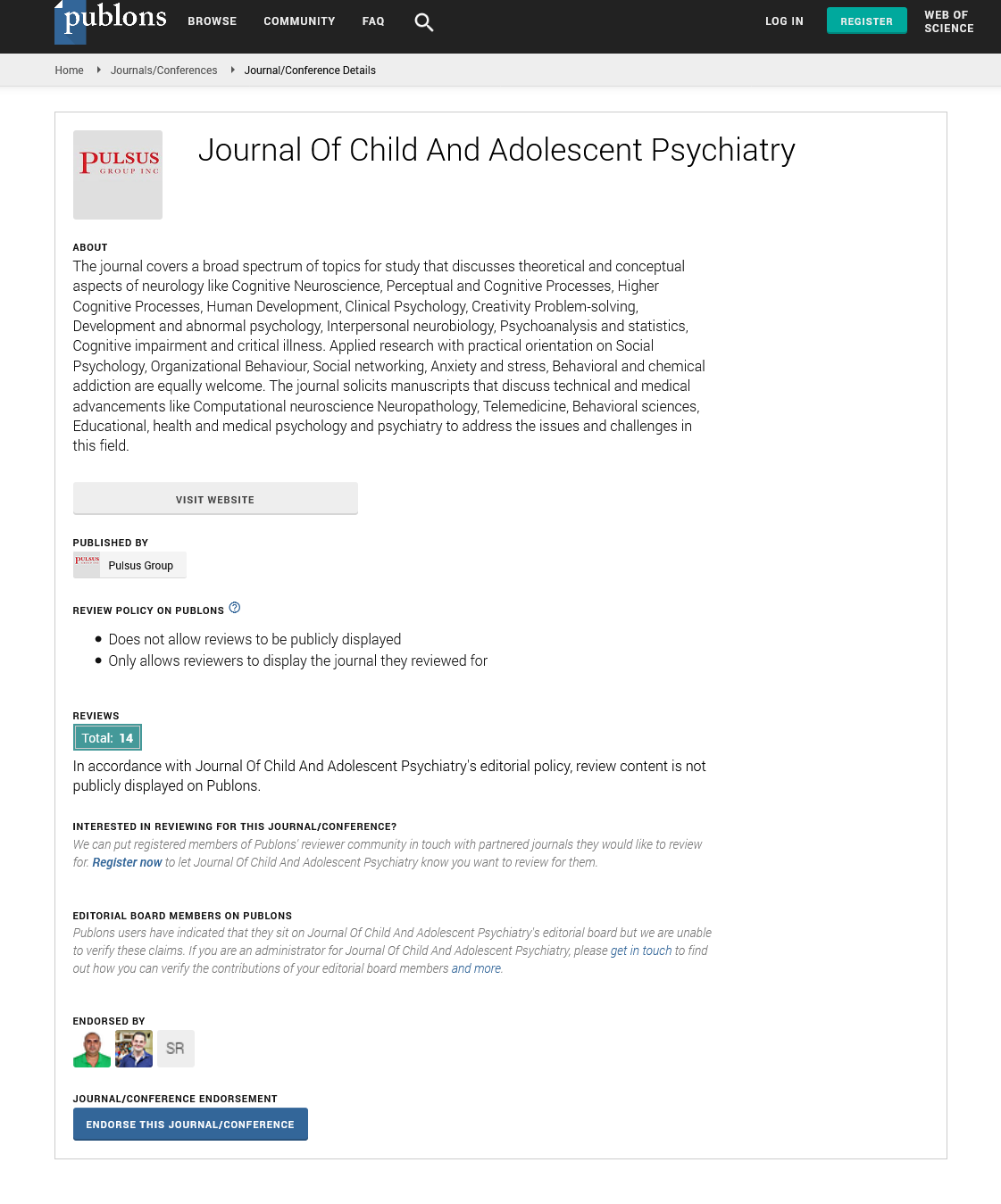An experience from Kigali, Rwanda, with the COVID-19 pandemic management in psychiatric patients
Received: 11-Nov-2021 Accepted Date: Nov 25, 2021; Published: 02-Dec-2021
Citation: Qriae M. An experience from Kigali, Rwanda, with the COVID-19pandemic management in psychiatric patients.Child Adolesc Psych.2021;5(5).
This open-access article is distributed under the terms of the Creative Commons Attribution Non-Commercial License (CC BY-NC) (http://creativecommons.org/licenses/by-nc/4.0/), which permits reuse, distribution and reproduction of the article, provided that the original work is properly cited and the reuse is restricted to noncommercial purposes. For commercial reuse, contact reprints@pulsus.com
Description
The COVID-19 epidemic has impacted every aspect of human life. The causative virus first appeared in Wuhan, China, in December 2019 and quickly spread over the world. Countries continue to be severely affected by the pandemic, with the number of deaths and confirmed infected new cases rising, primarily in Western countries, Latin America, and possibly a few instances in many African countries. In terms of health, the COVID-19 pandemic had an impact on not only physical health as a result of the coronavirus or other diseases, but also mental health. Patients, who had already suffered from mental illness, as well as new instances, were seen to face a variety of obstacles associated to the pandemic and the mental disease itself. The goal of this case study was to explain the treatment of mental health patients in Rwanda during the COVID-19 pandemic.
We took into account what we learned in a Kigali district hospital. It is suggested that the lessons learnt be applied to other communities with cultures comparable to Rwanda's.
The coronavirus disease COVID-19 is a lethal and extremely contagious coronavirus. A severe acute respiratory coronavirus2 causes it, and it is spreading from person to person.
In December 2019, COVID-19 was discovered in Wuhan, China, and by January 2020, all of China's provinces had confirmed COVID-2019 instances. The WHO declared Wuhan as the epicenter of the pandemic on March 13, 2020, but it was no longer a Chinese-only outbreak.
Many European countries and the United States reported an increase in confirmed COVID-19 cases at the time, and the number of deaths in some countries, such as Italy, began to rise. Africa and Latin America were predicted to represent the second wave of infection. This epidemic is currently affecting the entire world, including the United States, Latin America, and Brazil, where there is a rising number of confirmed cases. The second wave of COVID-19 infection is wreaking havoc on European countries. The coronavirus epidemic has affected people from all walks of life. Since the breakout in several nations throughout the world, the impact of this pandemic has become apparent in our highly interconnected and globalized world. The COVID-19 pandemic would have an impact on more than just physical health in terms of healthcare. Experts have shown that in the event of an epidemic or pandemic, those who have previously experienced psychiatric difficulties, the general public, and people who have never experienced mental health symptoms may all be at risk of developing symptoms mental disease issues during a pandemic can be caused by a variety of factors. For example, in COVID-19 situations, people all over the world have suddenly lost their jobs. A handful of people have committed suicide as a result of this problem. Furthermore, it was discovered that the abrupt adjustments will have a substantial impact on psychiatric patients' mental health, including limiting their access to psychiatric care. According to reports from several countries, a shortage of health staff has led to the majority of health workers prioritizing COVID-19 patients. Managing mental illness in already diagnosed patients has proven to be a difficult task for mental health professionals. However, in some developed societies with well-developed infrastructures, various measures such as tele-psychiatry consultations, home delivery of medications, psychosocial support, and, in some cases, rapid coronavirus testing have been implemented to aid in the management of mental illness during the pandemic. Psychiatric patients were treated as needed during the lockdown until today, with slight setbacks due to the pandemic's unpredictability. There is currently no research on the potential challenges of psychiatric illness and the COVID-19 pandemic in Rwanda. Psychiatric and neuropsychiatric patients, as well as their caregivers, may be confused regarding the symptoms of COVID-19 and other mental health or neuropsychiatric illnesses, according to health officials. As a result, mental health experts were called in to explain the differences in symptoms, particularly epilepsy symptoms and corona virus symptoms. Symptom differences were explained in local language (Kinyarwanda) it was asked that mental health personnel make it available to all patients and caregivers. It was then displayed on the hospital's mental health department's dashboard. The use of a face mask has been shown to be effective in preventing the transmission of COVID-19 and other respiratory infectious disorders. During the outbreak, it is critical to wear a face mask at all times in public places. People should use face masks and wear them properly, and wearing a face mask should be a commitment for everyone in the fight against pandemic spread.
It should not be a requirement of the government, and citizens should not be forced to accept it in order to avoid punishment. Patients were taught about the need of wearing a facemask and why they should be responsible for it. Patients and caregivers were informed about the mask's good standard attributes, the daily time restriction for using a facemask, and the proper hygiene of a facemask. The psychiatric department has offered facemasks to patients and their caretakers to aid in the treatment of psychiatric patients. The advent of an epidemic or pandemic can have a negative impact on people's mental health. In persons who are currently suffering from a mental disorder, this could grow even worse. Increasing treatment measures for mental health patients with the fortitude to do so until the epidemic is over is highly recommended till the conclusion of the pandemic. Rwanda's experience could serve as a model for other countries, particularly those with cultures comparable to Rwanda's. As the epidemic continues to spread, mental health professionals should continue to educate mental health patients about their role in the fight against the pandemic by safeguarding themselves.






